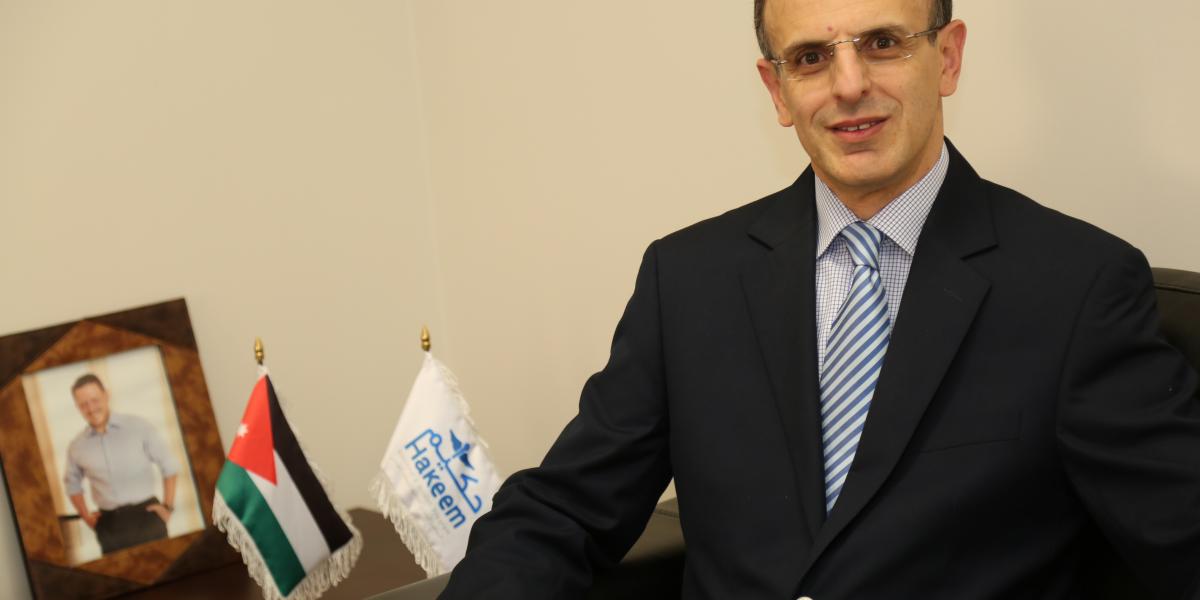Kamal: “We are working towards the implementation of «Hakeem» program in 100 health care institutions”

The CEO of Electronic Health Solutions Company (EHS) Eng. Feras Kamal said that the number of automated health care institutes has so far exceeded thirty, aiming to reach approximately 100 automated public health institutes by the end of the year.
Kamal explained that Hakeem is an electronic program which aims to support and develop the health care services in the medical sector by using information technology systems.
He pointed out that EHS will achieve this goal through the mechanism of implementing Health Electronic Records in the public health care sector, consisting of hospitals, in addition to comprehensive and primary clinics. “We aspire to integrate the private health care sector as well into the Hakeem program” he added.
In regards to governmental support for Hakeem, Kamal confirmed the government’s keenness to implement the automation of the public health care sector. He highlighted the current cooperation EHS has with three ministries: The Ministry of Health; since the end goal is to implement the national program to automate the healthcare sector, the Ministry of Communications and Information Technology; which provides the national fiber optic network for the use of Hakeem, and the Ministry of Planning; which is funding this program as it is a national program. Kamal confirmed the relentless attention that the implementation of the project receives from His Majesty King Abdullah II.
Regarding the medical benefit of this program, Kamal said that the main objective is the medical safety of the patient; as Hakeem aims to achieve a number of key health care benefits: reinforcing health care safety, the provision of a comprehensive database, and cost reduction. Stressing on the importance of proper interaction of the user with the system.
Kamal pointed out that Jordan has a leading role on the global level in terms of its vision and adoption of health care automation, which links the public medical sector in various parts of Jordan through a special system for archiving and management of medical files VistA. He reiterated that this would not have been achieved, without the harmony amongst the various factors related to the Hakeem program, most important of which is the legislative and regulatory environment, which has significantly served the implementation of the program.
Kamal noted that year 2020 will witness the achievement of initial medical linkage of the public sector health care institutes in Jordan to this application, so further support and development projects can be added later on. He pointed out that through the Electronic Health Solutions International Company (EHSI), the program is being implemented in other countries, the returns of which are directed mainly to support the national program Hakeem.
Regarding the Electronic Library of Medicine - (ELM), Kamal said that it is an electronic portal that facilitates access to free medical information more swiftly and effortlessly via the web for relevant bodies. With regards to the Hakeem Academy, Kamal said that its objective is to develop and train local expertise in the field of health informatics, through cooperation with the Yorkshire Centre for Health Informatics at the University of Leeds to develop training programs in health informatics, in addition to working on cooperation with a number of Jordanian universities to utilize the academy to benefit their students.
Commenting on the company’s social responsibility programs, Kamal pointed out that the company is focusing its cooperation on the areas which are specifically designed to strengthen and reinforce education in Jordan. He explained that EHS provides training opportunities for the youth to develop their abilities and give them the practical skills necessary to help them find the jobs and career opportunities they aspire to.